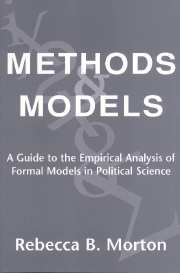3 - The Variety of Formal Models
Published online by Cambridge University Press: 10 December 2009
Summary
The discussion so far has centered on common characteristics of formal models. There are, however, a number of differences among classes of formal models in political science. The primary difference concerns assumptions about behavior: (1) rational choice or “economic man”; (2) models of human behavior from the behavioral sciences such as psychology (or psychology and economics combined), called “almost rational choice” or “boundedly rational choice”; or (3) no particular theory about individual choice processes. Models also differ in the extent to which the actors act strategically (as in some game theoretic models) or nonstrategically (as in decision theoretic models). Some models examine aggregate rather than individual behavior. Finally, the formal models in political science also vary in the mathematical techniques that are used.
This chapter examines the large variety of formal models used in political science and how they differ. We first consider rational choice, variations of rational choice, and game theoretic models. Then we review psychological models and models of aggregate behavior without explicit individual choice assumptions. The chapter concludes with a discussion of mathematical techniques.
Rational Choice-Based Models
Rational Choice as an “As If” Assumption
What Does Rational Choice Mean? In one sense, rational choice is about as nebulous a concept as one can imagine. Fundamentally it is very simple: actors have goals and make choices in order to achieve these goals. Researchers who work with rational choice models are often amazed that anyone could find such an innocuous assumption problematic.
- Type
- Chapter
- Information
- Methods and ModelsA Guide to the Empirical Analysis of Formal Models in Political Science, pp. 75 - 98Publisher: Cambridge University PressPrint publication year: 1999



